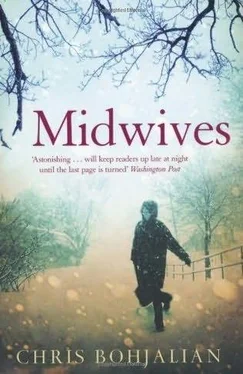Chris Bohjalian - Midwives
Здесь есть возможность читать онлайн «Chris Bohjalian - Midwives» весь текст электронной книги совершенно бесплатно (целиком полную версию без сокращений). В некоторых случаях можно слушать аудио, скачать через торрент в формате fb2 и присутствует краткое содержание. Жанр: Современная проза, на английском языке. Описание произведения, (предисловие) а так же отзывы посетителей доступны на портале библиотеки ЛибКат.
- Название:Midwives
- Автор:
- Жанр:
- Год:неизвестен
- ISBN:нет данных
- Рейтинг книги:5 / 5. Голосов: 1
-
Избранное:Добавить в избранное
- Отзывы:
-
Ваша оценка:
- 100
- 1
- 2
- 3
- 4
- 5
Midwives: краткое содержание, описание и аннотация
Предлагаем к чтению аннотацию, описание, краткое содержание или предисловие (зависит от того, что написал сам автор книги «Midwives»). Если вы не нашли необходимую информацию о книге — напишите в комментариях, мы постараемся отыскать её.
Midwives — читать онлайн бесплатно полную книгу (весь текст) целиком
Ниже представлен текст книги, разбитый по страницам. Система сохранения места последней прочитанной страницы, позволяет с удобством читать онлайн бесплатно книгу «Midwives», без необходимости каждый раз заново искать на чём Вы остановились. Поставьте закладку, и сможете в любой момент перейти на страницу, на которой закончили чтение.
Интервал:
Закладка:
"Thirty-one percent."
"What is it normally?"
"Oh, around forty-two in most women. Slightly lower in a pregnant woman."
"How about February? What was the woman's hematocrit in February?"
"Thirty-five."
"Is that an improvement?"
"A slight one."
"When one of your patients-a pregnant woman-has a hematocrit value of thirty-five, do you anticipate a bad outcome?"
"That's an odd question, and I'm not sure it's relevant. After all, I deliver babies in hospitals. If you mean, would it affect my handling of the woman's preg-"
"I'll repeat the question: Would you anticipate a bad outcome?"
Dr. Gerson was silent for a moment. Finally she said simply, "No."
"Thank you."
"You're welcome."
Stephen paced toward the windows with his hands behind his back. When he had put some distance between himself and the witness, he turned back toward her and asked, "You told us earlier that Charlotte Bedford's blood pressure was slightly higher than normal. Am I correct?"
"Yes."
"How would you have treated it?"
"I would have watched it very carefully. Perhaps placed her on bed rest. I don't know if I would have prescribed an antihypertensive. I might have."
"Would you have looked for protein in the urine?"
"Yes indeed."
"Based on those records, did Sibyl?"
"Apparently."
"Thank you. Is there any indication in Charlotte Bedford's medical records that she had ever been treated for hypertension in the past?"
"I didn't see any."
Slowly Stephen began to walk back toward her. I'd seen him do this enough during the day that I knew it was all part of a strategy of irritation and intimidation: He was about to invade the good doctor's personal space, practically leaning into the witness box with her.
"Am I correct that there's a box on the form that says 'Patient's History'?" he asked as he approached.
"Yes, there is."
"And it lists a variety of… conditions?"
"It does."
"What has been circled in the box?"
The doctor looked at the form and then read from it, "Bladder infections. German measles." When she looked up, Stephen was directly beside her, standing catty-corner so the jury could see both of their faces.
"That's it?"
"That's right."
"Have the words 'high blood pressure' been circled?"
"No."
He nodded and prepared for the kill. Sometimes, of course, even the best hunter misses his mark; sometimes the lion charges abruptly and flusters even the coolest rifleman. This would be one of those moments. And while Stephen would ask to have Dr. Gerson's remarks stricken from the record, and while the judge would agree, the jury had not missed what occurred and I could not imagine they would forget it when they were deciding my mother's fate.
"There is no indication that Charlotte Bedford shared her history of high blood pressure with Sibyl, is there, Doctor?"
"Bottom line, Counsel," the doctor said, speaking quickly but calmly, her voice gently condescending, "is that the records show the poor woman had symptoms of both anemia and high blood pressure. Both. No doctor or midwife in her right mind would ever have allowed that woman to labor at home."
We drove home Thursday night with the car's heater on, and I sat in the backseat with my knees curled up to my chest and my coat draped over me like a blanket. The heater in my mother's car could still warm the car like a woodstove, but during the previous winter it had developed a tendency to rattle, as if a piece of thick paper were caught somewhere in a vent.
My parents said little to each other, as they had most of the week. I imagine they were too spent to talk, and even if they had the energy, I doubt they would have known what to say. Occasionally my father would try and cheer up my mother by observing how Stephen had done a fine job taking apart one witness, or how the damaging testimony of another would be negated when Stephen began our defense.
Usually my mother would just mumble her agreement and stare at the trees we could see in the twilight.
When we got home, however, there were glass vases of roses awaiting my mother on the kitchen counters: a bunch of red ones, a bunch of yellow, a bunch of pink. My father had had them delivered during the day, and each vase had a large card beside it he'd made himself with old photos of the two of them, architectural blueprint paper, and the binder clips I knew he used for capabilities presentations for prospective clients. The cards were beautiful, and my mother was touched.
Later that night when they were passing my bedroom on the way to theirs, my mother was still talking about the cards and the flowers, and I found myself bragging about my father in phone calls to Rollie and Sadie and Tom.
Friday morning began with the testimony of a woman whose little baby my mother had hoped to deliver, but who had wound up giving birth via cesarean in a hospital instead. It had been a hard, unpleasant labor, and she said my mother had demanded she push for almost half a day: ten and a half hours of pushing and resting, pushing and resting, before my mother had finally-to use this woman's word-"allowed" them to leave for the hospital.
We were then treated to a man who insisted my mother had never warned him or his wife that there were greater risks involved with a home birth than with a hospital one. According to this fellow, he and his wife would never have tried to have their child at home had my mother been appropriately candid. Although the State was not allowed to ask the fellow how his baby's birth had turned out, my parents and I had to sit in agony throughout his testimony, aware of the fact that his infant was one of the tiny few whom my mother caught dead.
And, as lunch approached, the State squeezed in one more witness, a doctor who explained to us all what a prolonged second-stage labor meant, and the dangers it posed for the mother. The doctor was a researcher with the American College of Obstetricians and Gynecologists in Washington, D.C., an organization of which I am now, ironically, a dues-paying member. Like Dr. Gerson, he viewed labor as a dangerous circus stunt: He was the witness who in one especially rare moment of rhetorical flourish compared a hospital to a car seat, and then jumbled a car accident and a kitchen appliance.
But it was clear the jury got the point, and thought Dr. Geoffrey Lang was a wise and compelling man.
In another particularly brutal exchange from my mother's perspective, he managed to simultaneously explain why pushing too long endangered a woman, while casting yet one more aspersion upon my mother's competence: "It's perfectly reasonable that someone with the limited training of a midwife would suspect a ruptured cerebral aneurysm. Obviously, that's not what occurred in this case, but someone with only rudimentary obstetric education might think such a thing."
"What did occur?" Bill Tanner asked, and for the first time I heard spoken the word I'd seen written the month before on a wall in Stephen's office. Vagal. It was one of the words and expressions Tom Corts and I had seen scribbled in sprawling Magic Marker letters on the large sheets of white poster paper.
"She-and this is a shorthand term some doctors I know use in conversation-vagaled. She vagaled out." With clinical formality, he then began laying the groundwork for the testimony we would hear that afternoon from the medical examiner.
"You went easy on Farrell," my father told Stephen as we picked at our food during the recess for lunch. Farrell was the father who said my mother hadn't been clear about the risks that come with a home birth.
"He really wasn't all that damaging," Stephen said, and he asked Peter Grinnell to pass him a paper napkin from the metal box against the diner's wall.
"He made it sound like Sibyl hides things," my father continued.
Читать дальшеИнтервал:
Закладка:
Похожие книги на «Midwives»
Представляем Вашему вниманию похожие книги на «Midwives» списком для выбора. Мы отобрали схожую по названию и смыслу литературу в надежде предоставить читателям больше вариантов отыскать новые, интересные, ещё непрочитанные произведения.
Обсуждение, отзывы о книге «Midwives» и просто собственные мнения читателей. Оставьте ваши комментарии, напишите, что Вы думаете о произведении, его смысле или главных героях. Укажите что конкретно понравилось, а что нет, и почему Вы так считаете.











